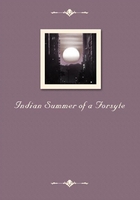
第21章
AT TIMOTHY'S
The possessive instinct never stands still.Through florescence and feud,frosts and fires,it followed the laws of progression even in the Forsyte family which had believed it fixed for ever.
Nor can it be dissociated from environment any more than the quality of potato from the soil.
The historian of the English eighties and nineties will,in his good time,depict the somewhat rapid progression from self-contented and contained provincialism to still more self-contented if less contained imperialism--in other words,the 'possessive'instinct of the nation on the move.And so,as if in conformity,was it with the Forsyte family.They were spreading not merely on the surface,but within.
When,in 1895,Susan Hayman,the married Forsyte sister,followed her husband at the ludicrously low age of seventy-four,and was cremated,it made strangely little stir among the six old Forsytes left.For this apathy there were three causes.First:the almost surreptitious burial of old Jolyon in 1892down at Robin Hill--first of the Forsytes to desert the family grave at Highgate.That burial,coming a year after Swithin's entirely proper funeral,had occasioned a great deal of talk on Forsyte 'Change,the abode of Timothy Forsyte on the Bayswater Road,London,which still col-lected and radiated family gossip.Opinions ranged from the lamentation of Aunt Juley to the outspoken assertion of Francie that it was 'a jolly good thing to stop all that stuffy Highgate business.'Uncle Jolyon in his later years--indeed,ever since the strangeand lamentable affair between his granddaughter June's lover,young Bosinney,and Irene,his nephew Soames Forsyte's wife--had noticeably rapped the family's knuckles;and that way of his own which he had always taken had begun to seem to them a little wayward.The philosophic vein in him,of course,had always been too liable to crop out of the strata of pure Forsyteism,so they were in a way prepared for his interment in a strange spot.But the whole thing was an odd business,and when the contents of his Will became current coin on Forsyte 'Change,a shiver had gone round the clan.Out of his estate (L145,304gross,with liabilities L357s.4d.)he had actually left L15,000to "whomever do you think,my dear?To Irene!"that runaway wife of his nephew Soames;Irene,a woman who had almost disgraced the family,and--still more amazing was to him no blood relation.Not out and out,of course;only a life interest--only the income from it!Still,there it was;and old Jolyon's claim to be the perfect Forsyte was ended once for all.That,then,was the first reason why the burial of Susan Hayman--at Woking--made little stir.The second reason was altogether more expansive and imperial.Besides the house on Campden Hill,Susan had a place (left her by Hayman when he died)just over the border in Hants,where the Hayman boys had learned to be such good shots and riders,as it was believed,which was of course nice for them,and creditable to everybody;and the fact of owning something really countrified seemed somehow to excuse the dispersion of her remains--though what could have put cremation into her head they could not think!The usual invitations,however,had been issued,and Soames had gone down and young Nicholas,and the Will had been quite satisfactory so far as it went,for she had only had a life interest;and everything had gone quite smoothly to the children in equal shares.
The third reason why Susan's burial made little stir was the most expansive of all.It was summed up daringly by Euphemia,the pale,the thin:"Well,I think people have a right to their own bodies,even when they're dead."Coming from a daughter of Nicholas,a Liberal of the old school and most tyrannical,it was a startling remark--showing in a flash what a lot of water had run under bridges since the death of Aunt Ann in '86,just when the proprietorship of Soames over his wife's body was acquiring the uncertainty which had led to such disaster.Euphemia,of course,spoke like a child,and had no experience;for though well over thirty by now,her name was still Forsyte.But,making all allowances,her remark did undoubtedly show expansion of the principle of liberty,decentralisation and shift in the central point of possession from others to oneself.When Nicholas heard his daughter's remark from Aunt Hester he had rapped out:"Wives and daughters!There's no end to their liberty in these days.Iknew that 'Jackson'case would lead to things--lugging in Habeas Corpus like that!"He had,of course,never really forgiven the Married Woman's Property Act,which would so have interfered with him if he--had not mercifully married before it was passed.But,in truth,there was no denying the revolt among the younger Forsytes against being owned by others;that,as it were,Colonial disposition to own oneself,which is the paradoxical forerunner of Imperialism,was making progress all the time.They were all now married,except George,confirmed to the Turf and the Iseeum Club;Francie,pursuing her musical career in a studio off the King's Road,Chelsea,and still taking 'lovers'to dances;Euphemia,living at home and complaining of Nicholas;and those two Dromios,Giles and Jesse Hayman.Of the third generation there were not very many--young Jolyon had three,Winifred Dartie four,young Nicholas six already,young Roger had one,Marian Tweetyman one;St.John Hayman two.But the rest of the sixteen married--Soames,Rachel and Cicely of James'family;Eustace and Thomas of Roger's;Ernest,Archibald and Florence of Nicholas';Augustus and Annabel Spender of the Hayman's--were going down the years unreproduced.